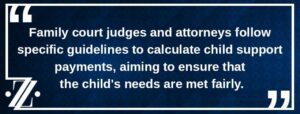What Happens When a Parent Lies About Income in a Child Support Case
 Child support ensures that children’s needs are met after parents separate or divorce. However, the system’s effectiveness depends on the honesty of both parents when reporting his or her income.
Child support ensures that children’s needs are met after parents separate or divorce. However, the system’s effectiveness depends on the honesty of both parents when reporting his or her income.
When a parent lies in a child support case, the consequences can be severe and financially devastating for both the dishonest parent and the child relying on regular support payments. At Zentz Law in Indiana, we are dedicated to fighting for your family’s financial future. This guide explains the repercussions of misrepresenting assets in child support calculations.
Schedule a free consultation at 317-220-6056 to discuss your child support claim with a Zentz Law lawyer.
Understanding Child Support
Child support is a crucial financial obligation designed to ensure that children’s needs are met when parents are no longer together. Child support covers the costs of raising a child, including housing, food, education, and healthcare.
The ultimate goal of setting a child support amount is to maintain the child’s standard of living after the parents separate. This means that both parents contribute in a way that reflects their financial capability, providing the child with stability and security.
How Child Support Amounts Are Determined
Family court judges and attorneys follow specific guidelines to calculate child support payments, aiming to ensure that the child’s needs are met fairly.


- Combined Parental Income: The judge calculates both parents’ resources by adding together their gross pay. Factors include wages, salaries, bonuses, commissions, and any other sources of money coming into each household. Both parents are expected to provide accurate and honest information to find a fair calculation.
- Income Shares Model: Indiana uses the income shares model, which assumes that children should receive the same proportion of parental pay that they would have if the parents lived together. The combined income is used to determine the total child support obligation, which is then divided between the parents based on their respective shares of the combined income.
- Proportional Contribution: Each parent’s share of the child support obligation is based on the proportion of the combined assets. For instance, if one parent earns 60%, they would be responsible for 60% of the child support obligation. This means that each parent contributes fairly to the child’s needs.
- Basic Child Support Obligation: The court refers to state-specific child support guidelines to determine the basic child support obligation. The certain amount the judge deems necessary to cover the child’s basic needs, for example, housing, food, and clothing. The guidelines provide a standardized way to calculate this base amount.
- Additional Expenses: The court considers additional expenses like healthcare, childcare, and educational costs. These exceptions are typically added to the basic child support obligation and are divided between the parents according to each ex’s income.
- Custody Arrangements: The certain amount of time each parent spends with the child can also affect the child support calculation. For instance, if one parent has primary custody, the non-custodial parent may pay more in child support to account for the custodial parent’s increased costs of raising the child.
- Adjustments and Deviations: Under some circumstances, the court may adjust the standard calculation based on special circumstances, such as extraordinary medical costs, high travel expenses for visitation, or the child’s special needs. These adjustments see that the support amount is fair and appropriate given the family circumstances.
The court assumes that each party will honestly report their salary and assets. When that does not happen, it disrupts this balance, potentially leading to unfair financial burdens on the custodial parent and insufficient support for the child.
Misreporting the money each person has access to undermines the integrity of the system and can have long-lasting impacts on the child’s well-being.
The Importance of Accurate Income Reporting
Accurate reporting is non-negotiable in child support calculations. It ensures that the child receives adequate support to meet their needs and that the financial responsibility is fairly distributed between both parents.
Honesty upholds the integrity of the legal system and prevents unnecessary legal complications. When a parent lies about his or her income, it not only affects the immediate financial child support issues but can also lead to long-term legal and financial consequences.
Hold the other parent accountable for child support with Zentz Law. Call us at 317-220-6056 for a free case evaluation.
Common Ways Parents Lie About Income for Child Support Payments
Misrepresenting assets and pay in family law court and child support documents can take various forms.
Here are some common methods a person may use to mislead the court about their financial circumstances and withhold relevant information:
Underreporting pay: One common method of misrepresentation is underreporting salary or other payments. This can involve hiding a portion of one’s salary or wages, working under the table, or receiving payments in cash to avoid declaring them.
Sometimes a parent will coordinate with an employer to work ‘under the table’ for their job, thereby receiving more money than their tax records show. They typically do this to hide their pay and get their support reduced.
Courts take underreporting very seriously and have measures in place to detect it.
Overstating expenses: Another way one parent may cheat is by overstating their expenses. This might include inflating business or personal expenses to reduce what is considered available for child support.
By exaggerating costs, the paying parent attempts to lower their child support obligations unfairly. Overstating expenses is fraudulent and undermines the fairness of the support system.
Hiding assets: Hiding assets is a more sophisticated method of misrepresentation. A parent may open bank accounts the other parent doesn’t know about. Or they may hide income or valuable property by temporarily transferring them to other people.
Falsifying documents: Falsifying documents are when a parent owes child support and creates financial documents like pay stubs, taxes, or bank and retirement statements. They submit this false paperwork to the court to mislead about one’s finances. Falsifying legal documents is a severe violation that can lead to fines and imprisonment.
Honesty in financial disclosures is essential to ensure fair and just child support arrangements. A parent who chooses to hide income to avoid paying child support undermines the legal process and harms the well-being of the child involved.
Legal Consequences of Lying About Income
When dealing with family law and child support, honesty about financial matters is crucial.
Here are the legal consequences of child support fraud:
Contempt of court: When a parent lies, they can be held in contempt of court. Contempt means they have disobeyed court orders or failed to comply with the legal process, both of which can result in fines, penalties, and even jail time.
Perjury charges: Lying under oath or providing false information in legal documents is fraud and can lead to perjury charges. Perjury is a serious criminal offense that results in significant penalties, including imprisonment. If a parent knowingly and willfully lies in a child support case, it is considered perjury.
Recalculation of support payments: If a parent is caught lying, the court will recalculate the child support payments. This recalculation can include retroactive adjustments, meaning the dishonest parent will owe back child support for the period during which they lied.
Your attorney will help update the financial information and recalculate the new amount of child support. If the forensic accountant discovers hidden pay, it will be updated to reflect the true financial situation and create a significant change in how much support is paid each month.
Impact on custody arrangements: Dishonesty can also affect custody arrangements. Courts prioritize the best interests of the child, and a parent who lies about their financial situation may be seen as untrustworthy or unfit. Typically, visitation is a separate issue, but lying to a judge is a crime and can lead to changes in custody or visitation rights.
Damage to credibility: Lying can damage a parent’s credibility in court. Every judge relies on honest testimony and accurate information to make informed decisions. A parent who is found to be dishonest may lose the court’s trust, making it harder for them to file a motion or request effectively.
Financial penalties: In addition to recalculated child support, a parent who lies about their finances may face additional financial penalties. These can include fines imposed by the court for the act of lying itself or for any costs incurred by the other parent in uncovering the truth.
Legal fees: The dishonest parent may receive a child support order requiring them to pay the other parent’s legal fees leading to additional court proceedings. This can add a significant financial burden on top of any back child support owed.
Maintaining honesty in all legal proceedings is crucial. The consequences of lying can be severe and long-lasting, impacting not only the parent’s finances and their relationship with their child, but also their standing in court.
Don’t let child support dishonesty go unchecked, contact a Zentz Law lawyer at 317-220-6056 to determine if there are grounds to modify child support orders.
How To Prove Underreported Income in Child Support Cases


Here are some methods for detecting child support fraud:
Role of a forensic accountant: Accountants are experts at uncovering hidden money and assets. Forensic accounting can provide the evidence needed to prove misrepresentation in court.
Investigative techniques: Various investigative techniques are employed to detect fraud. These include reviewing bank statements, financial records, and tax returns. Subpoenas may be issued to gather information from employers or financial institutions. These techniques help build a case against the dishonest parent. Investigators may also look into spending patterns and lifestyle evidence to detect inconsistencies.
Testimonies and witnesses: Testimonies from employers, clients, or business partners can also be valuable in proving misrepresentation. Witnesses can provide insight into the parent’s actual finances, contradicting false claims made in court. Their statements can strengthen the case for honest reporting. Gathering credible testimonies helps to challenge and disprove fraudulent claims effectively.
Detecting fraud requires a combination of financial expertise, thorough investigation, and credible testimonies.
Steps To Take if You Suspect Income Fraud
Suspecting that the other parent is committing fraud in a child support case can be daunting and exhausting circumstances.
Here are the steps you should take if you suspect child support fraud:
Consult with a family law attorney: If you suspect that the other parent is lying about their assets, it is essential to consult with a family lawyer. An experienced child support attorney will represent your interests, collect evidence, and help you prove child support fraud.
Gathering evidence: Gathering evidence is crucial in building a case against the dishonest parent. Your attorney will request copies of bank statements, pay stubs, tax returns, property records, and other financial documents.
Filing a motion with the court: Once you have collected sufficient evidence, your attorney will file a motion with the court to report child support fraud.
During the court hearing, the judge will review the evidence presented and decide based on the findings.
Filing a motion is a formal way to request the court’s intervention and ensure that the other parent’s financial declarations are thoroughly examined. Proving child support fraud can be complicated. Working with a knowledgeable attorney will significantly increase your chances of proving fraud and securing a fair child support arrangement.
Hold dishonest parents accountable for committing child support fraud with help from a Zentz Law child support attorney. Call 317-220-6056 for a free consultation.
Preventing Income Fraud in Child Support Determination
Regular financial reviews: Conducting regular financial reviews can help ensure that reporting remains accurate. Periodic reviews of finances can reveal any discrepancies early on, allowing for timely adjustments and preventing long-term fraud.
Transparent communication: Maintaining transparent communication between both parents regarding financial matters is essential. When former partners have open discussions about pay and expenses, they build trust and reduce the likelihood of dishonesty. Transparency is a cornerstone of effective co-parenting and financial responsibility.
Legal safeguards: Utilizing legal safeguards, such as wage garnishment included in a child support order, can help ensure that child support payments are made accurately and on time.
Real-Life Examples and Case Studies


The court recalculated the child support payments and awarded a significant back payment owed to the custodial parent.
Case Study 2: In another case, a parent overstated their business expenses to reduce child support obligations. A forensic accounting team discovered many of the business expenses were personal rather than business-related. This is not a common occurrence, but an example of how ‘creative’ dishonest people can be when trying to avoid making fair child support payments.
The court adjusted the child support order and imposed hefty penalties on the person who filed a fraudulent claim.
Each situation provides a clear example of parents who successfully challenged exes trying to avoid paying fair support for their children. The court will make an example of any party who is being untruthful.
Contact a Zentz Law Attorney if You Suspect Child Support Fraud
Accurate reporting in child support cases is crucial for ensuring children receive the support they need and deserve. Lying about finances not only undermines the legal process but also jeopardizes the financial stability of the child’s upbringing.
The consequences of such actions can be severe, for example, legal penalties to adjustments in custody arrangements.Our attorney is here to ensure ex-spouses pay the child support your child deserves.
At Zentz Law, our attorney stands firm in his commitment to protecting your family’s future and ensuring justice is served. Don’t take on a dishonest ex on your own. If you suspect your ex is committing child support fraud, seek legal advice immediately so we can protect your legal rights.
If you have further questions about proving child support fraud or legal assistance to prove your case, contact Zentz Law today at 317-220-6056.


